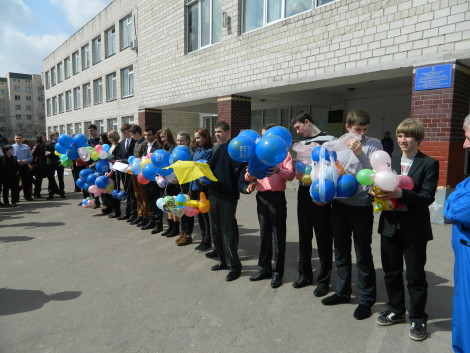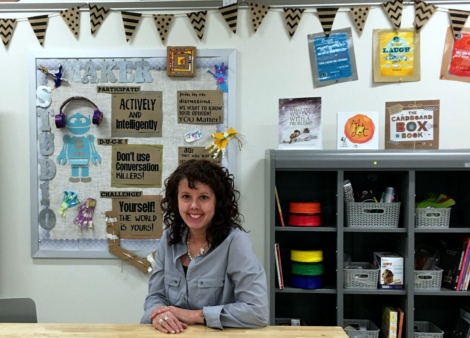
BrainPOP in the Ukraine – Michael Baer Delivers a Special Gift
Posted by Andrew Gardner on
Michael Baer’s passion for teaching mirrors his own passion for learning: he delights in the thrill of a search, the celebration of a find, and the gift of bringing to light a discovery to share with others. Widely recognized for his impact on education, Michael currently teaches Earth & Space science, Physics, and Physical Science at South Adams High School in northeast Indiana and is director of highly-acclaimed dots in blue water, a program “Making a World of Difference” by sending teachers and students to deliver student-developed water purifier systems to Haiti and beyond.
As a career educator, I could not have received a greater compliment that this from my host teacher on a recent visit to Ukraine: “A couple of days ago we had crazy time with two Americans who woke us up and made us to think positively” –Oleksandr Korotkov, English teacher at Specialized School of Foreign Languages in Sofiivska-Borshchagivka, a suburb of Ukraine’s capital city, Kiev.
You see, I was one of those two teachers: I was privileged to travel with Teachers for Global Classrooms (TGC) Program, an exchange and professional development opportunity for secondary school teachers sponsored by the U.S. Department of State and administered by the non-profit organization International Research & Exchanges Board, Inc (IREX). Through the program, teachers from across the United States learn how to advance their schools’ global education practices, internationalizing teaching and learning in their classrooms. And I got to be one of those teachers, sharing my two week experience with a cohort of about a dozen teachers from across the United States. And, I took BrainPOP with me, too. More of that later.
Ukraine is a beautiful country, with diverse landscapes and beautiful cities. I was immediately taken by Kiev’s stark contrasts: dull, square buildings provided stark remnants of the Soviet and Nazi-occupation eras, yet several lavishly-gilded, domed cathedrals–such as St. Michael’s–garnish the city as well. As the bus clattered over cobblestone and brick streets, passed occasionally by tired-looking trolleys and small unfamiliar automobiles, I saw a polarity of wealth–Bentleys and Mercedes contrasted against the poor, with their pushcarts of vegetables. I fell in love with this country, and admire its resilience amid a heritage of political and economic change.
Speaking of contrasts, I spent a full day visiting Chernobyl, site of the 1986 nuclear disaster. As a physics, chemistry, and earth & space teacher, I found it absolutely sobering. Having annually taught about radioactivity and nuclear fission, it was haunting to see the ghost town that neighboring model village of Pripyat had become: a testimony of barren apartments and office buildings, abandoned cinemas, and sporting facilities such as indoor pool and soccer stadium. Even an amusement park stood silent and foreboding, unused. Monuments to those who sacrificed their lives to control the damage had been erected in several locations surrounding Chernobyl. Hand-held Geiger counters revealed pockets of radiation, “hot spots” that remain throughout the area, and upon leaving the fallout zone, we were required to have body scans to detect radiation at two police checkpoints.
School is truly the center of the community, in many cases, so it is not uncommon to see several students–and therefore supervising teachers–stay until 7 or 8 pm! Schools in Ukraine come in many “flavors”: public, private, gimnasium, lyceum, collegium, or other variations. Typically Primary school is grades K-4, secondary is 5-8, and high school is 9-11. Much of Ukraine’s school still follow a Soviet-style of classroom management: sitting up straight, arms folded properly across one another on the desk, eyes constantly on the teacher. Instruction is either direct from the teacher’s lectures or from reading. Rote memorization is a key to learning, and students often enter competitions and are recognized for their ability to recite from memory long poetry passages or dramatic readings. Singing is often used as a tool to reinforce this rote learning. It was interesting to see that science is not taught as hands-on as it is in the U.S. where STEM has become so emphasized. When partner teacher Kevin Jacoves of New Jersey and I had the seniors do an Egg Lander project on Cosmonautics Day (a holiday commemorating Yuri Gagarin’s first manned space flight), teachers and students alike were excited, telling us they had NEVER done a project lab like that before, hence “crazy time with two Americans”.
It is the Ukrainian custom to give gifts of friendship when visiting someone, so one entire suitcase was dedicated to small tokens of my appreciation for teachers who allowed me to visit their classrooms, students who gave me facility tours, and other administrators and government dignitaries. The biggest gift of all: I introduced them to Tim and Moby. For the first time, I was able to share the wealth of resources BrainPOP has to offer with students and teachers in Ukraine. Expressions such as “It’s the best (website) I’ve ever seen!” and “Our student s enjoy it very much and ask if it’s possible to create it in Ukrainian or/and Russian” reflect just how hungry these students are for good education experiences and how immediate an impact BrainPOP has already made. The “Free Stuff”, “Lesson Ideas”, “Activities”, and “Experiments” sections provided outstanding resources to help promote experiential, interactive learning. Thanks to the BrainPOP staff in making it possible for me to “give” a subscription so that my new teacher and student friends in Sofiivska-Borshchagivka might experience learning in a whole new way.
“… we had crazy time with two Americans who woke us up and made us to think positively”— Perhaps I have read it all wrong: do you think maybe he was referring to Tim and Moby?
Michael Baer














